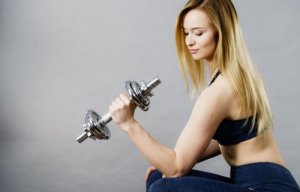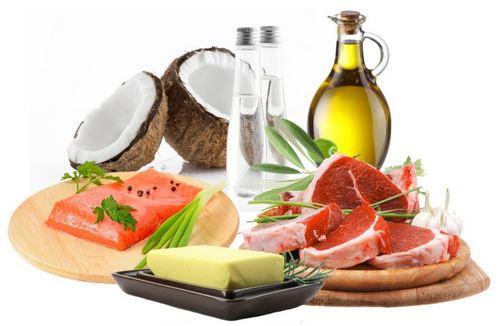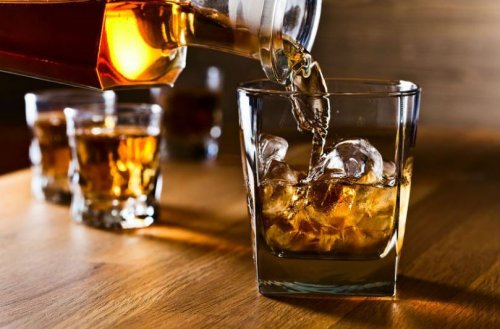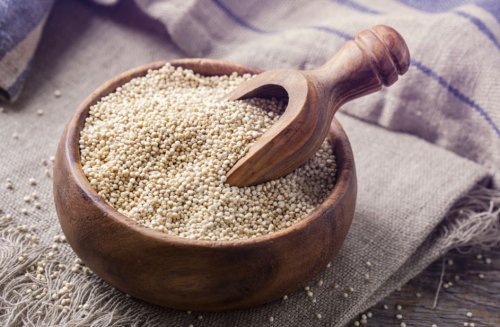How Fat Negatively Impacts Muscle

A new study from Loma Linda University in California has found that trans fat increases the risk of cardiovascular disease. It also shows that it negatively impacts muscle.
Trans fat originates from healthy unsaturated vegetable oils. The problem is that it is then hydrogenated for better shelf stability. This may mean that it is harmful to your health and that this type of fat negatively impacts muscle.
You can usually find it in fast food, processed bread, cookies, and commercial condiments.
Trans fat interferes with the body’s absorption and utilization of amino acids. Consequently, this hinders muscle protein synthesis meaning that fat negatively impacts muscle by aggravating muscle decomposition.
Which kind of fat negatively impacts muscle?

There are three kinds of fat: saturated, unsaturated (including monounsaturated and polyunsaturated), and trans fats.
Saturated fat has negative properties – it raises bad cholesterol levels. Yet, your body needs it to produce testosterone and help fat-soluble vitamins.
Unsaturated fat also has its dark side – it oxidizes easily and forms free radicals. On the other hand, it helps lower cholesterol, improves joint health, and enhances the body’s muscle development.
Trans fatty acids only provide negative effects. They increase bad cholesterol, reduce fat loss, damage cell membranes, limit muscle development, and promote muscle decomposition. In other words, this type of fat negatively impacts muscle.
Exercise is important to have muscles but it is equally or even more important to eat a balanced diet. As such, we have gathered a list of foods you should avoid if you want to gain muscle.
Alcohol

Alcohol provides empty calories from carbohydrates and goes straight to your liver. The worst part is that it interferes with metabolic processes that redirect nutrients, vitamins, and minerals to your muscles and release stored fat so that it can be “burned”.
White and refined sugars
Carbohydrates are not bad when it comes to gaining muscle, as long as you choose “good” carbohydrates. In other words, natural and unprocessed foods such as unprocessed and unaltered fruits, vegetables, whole grains, green vegetables, etc.
Fruit juice
Neither packaged or homemade juices provide the same properties as fresh fruit. Natural fruits do help you since they are rich in carbohydrates and fibers. What’s more, this combination is beneficial to help muscle gain and avoid storing fat.
Others
- Industrial desserts rich in hydrogenated or trans fatty acids and sugars: The mixture of sugar, refined flours, and fat is perfect for gaining weight, but in the form of fat, not muscle.
- Sports or energy drinks: Very high in simple sugars. Drink them when you are doing physical activity. If you drink them all the time, they could make you gain body fat.
- Fried food: High-calorie food that is often fried and battered with oils that are not good for you.
- Fatty deli meat: Choose better quality meat such as ham, shoulder, and jerky, which are made with salted pork meat. This ensures a high content of proteins of high biological value, B vitamins, and minerals such as iron, zinc, and selenium.
- Salty and roasted appetizers: They are not very filling and they are high in salt.
- Ice cream and desserts: When it comes to gaining muscle, you will have to find alternative desserts rich in protein such as sugar-free flan or protein pancakes.
Foods that help with muscle gain

On the other hand, let us also talk about foods that help you gain muscle:
- Coffee: Besides helping with bodybuilding, it also reduces post–exercise soreness.
- Pork: Since it contains proteins of high biological value and B vitamins. In addition, pork is a source of natural creatine.
- Nori seaweed: Very rich in iodine and helps regulate the thyroid gland, adjusting blood sugar metabolism. It also contains the antioxidant selenium. This type of seaweed helps with weight loss and prevents water retention.
- Quinoa: provides lysine and methionine, which are important amino acids for neural development and insulin metabolism, respectively. It also provides unsaturated fats, vitamins B and E, and minerals such as calcium, iron, phosphorus, and magnesium.
- Lentils: This legume neutralizes the acids produced by muscles from training. It also provides carbohydrates, proteins, folic acid, zinc, and potassium. In addition, it is a source of vegetable iron to supplement your diet.
A new study from Loma Linda University in California has found that trans fat increases the risk of cardiovascular disease. It also shows that it negatively impacts muscle.
Trans fat originates from healthy unsaturated vegetable oils. The problem is that it is then hydrogenated for better shelf stability. This may mean that it is harmful to your health and that this type of fat negatively impacts muscle.
You can usually find it in fast food, processed bread, cookies, and commercial condiments.
Trans fat interferes with the body’s absorption and utilization of amino acids. Consequently, this hinders muscle protein synthesis meaning that fat negatively impacts muscle by aggravating muscle decomposition.
Which kind of fat negatively impacts muscle?

There are three kinds of fat: saturated, unsaturated (including monounsaturated and polyunsaturated), and trans fats.
Saturated fat has negative properties – it raises bad cholesterol levels. Yet, your body needs it to produce testosterone and help fat-soluble vitamins.
Unsaturated fat also has its dark side – it oxidizes easily and forms free radicals. On the other hand, it helps lower cholesterol, improves joint health, and enhances the body’s muscle development.
Trans fatty acids only provide negative effects. They increase bad cholesterol, reduce fat loss, damage cell membranes, limit muscle development, and promote muscle decomposition. In other words, this type of fat negatively impacts muscle.
Exercise is important to have muscles but it is equally or even more important to eat a balanced diet. As such, we have gathered a list of foods you should avoid if you want to gain muscle.
Alcohol

Alcohol provides empty calories from carbohydrates and goes straight to your liver. The worst part is that it interferes with metabolic processes that redirect nutrients, vitamins, and minerals to your muscles and release stored fat so that it can be “burned”.
White and refined sugars
Carbohydrates are not bad when it comes to gaining muscle, as long as you choose “good” carbohydrates. In other words, natural and unprocessed foods such as unprocessed and unaltered fruits, vegetables, whole grains, green vegetables, etc.
Fruit juice
Neither packaged or homemade juices provide the same properties as fresh fruit. Natural fruits do help you since they are rich in carbohydrates and fibers. What’s more, this combination is beneficial to help muscle gain and avoid storing fat.
Others
- Industrial desserts rich in hydrogenated or trans fatty acids and sugars: The mixture of sugar, refined flours, and fat is perfect for gaining weight, but in the form of fat, not muscle.
- Sports or energy drinks: Very high in simple sugars. Drink them when you are doing physical activity. If you drink them all the time, they could make you gain body fat.
- Fried food: High-calorie food that is often fried and battered with oils that are not good for you.
- Fatty deli meat: Choose better quality meat such as ham, shoulder, and jerky, which are made with salted pork meat. This ensures a high content of proteins of high biological value, B vitamins, and minerals such as iron, zinc, and selenium.
- Salty and roasted appetizers: They are not very filling and they are high in salt.
- Ice cream and desserts: When it comes to gaining muscle, you will have to find alternative desserts rich in protein such as sugar-free flan or protein pancakes.
Foods that help with muscle gain

On the other hand, let us also talk about foods that help you gain muscle:
- Coffee: Besides helping with bodybuilding, it also reduces post–exercise soreness.
- Pork: Since it contains proteins of high biological value and B vitamins. In addition, pork is a source of natural creatine.
- Nori seaweed: Very rich in iodine and helps regulate the thyroid gland, adjusting blood sugar metabolism. It also contains the antioxidant selenium. This type of seaweed helps with weight loss and prevents water retention.
- Quinoa: provides lysine and methionine, which are important amino acids for neural development and insulin metabolism, respectively. It also provides unsaturated fats, vitamins B and E, and minerals such as calcium, iron, phosphorus, and magnesium.
- Lentils: This legume neutralizes the acids produced by muscles from training. It also provides carbohydrates, proteins, folic acid, zinc, and potassium. In addition, it is a source of vegetable iron to supplement your diet.
All cited sources were thoroughly reviewed by our team to ensure their quality, reliability, currency, and validity. The bibliography of this article was considered reliable and of academic or scientific accuracy.
- Hubbard, R., Westengard, J., Sanchez, A., Horning, M., & Barth, J. Apparent skeletal muscle loss related to dietary trans fatty acids in a mixed group of omnivores and vegetarians. Nutrition research. 2003; 23(5): 651-658.
- Lipina C, Hundal HS. Lipid modulation of skeletal muscle mass and function. J Cachexia Sarcopenia Muscle. 2017 Apr;8(2):190-201.
- Liu AG, Ford NA, Hu FB, Zelman KM, Mozaffarian D, Kris-Etherton PM. A healthy approach to dietary fats: understanding the science and taking action to reduce consumer confusion. Nutr J. 2017 Aug 30;16(1):53.
- Pipoyan D, Stepanyan S, Stepanyan S, Beglaryan M, Costantini L, Molinari R, Merendino N. The Effect of Trans Fatty Acids on Human Health: Regulation and Consumption Patterns. Foods. 2021 Oct 14;10(10):2452.
- Welch AA, MacGregor AJ, Minihane AM, Skinner J, Valdes AA, Spector TD, Cassidy A. Dietary fat and fatty acid profile are associated with indices of skeletal muscle mass in women aged 18-79 years. J Nutr. 2014 Mar;144(3):327-34.
This text is provided for informational purposes only and does not replace consultation with a professional. If in doubt, consult your specialist.








